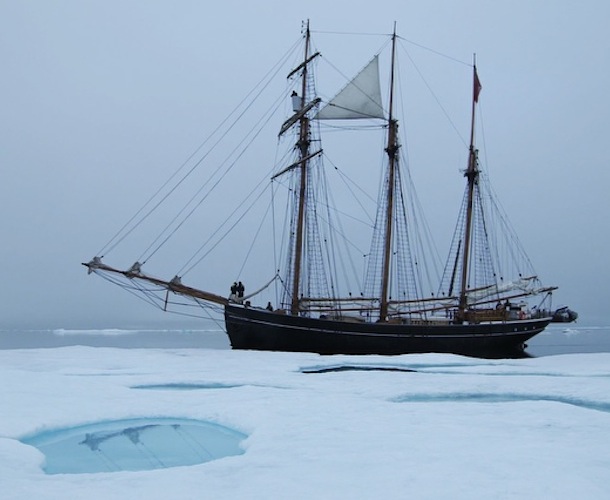Movie Review: “Expedition to the End of the World” — Cool Beauty Marred By Too Much Hot Air
As expected, Expedition to the End of the World is visually stunning. The problem is that we needed to see more of the world and hear less yakking from the humans who inhabit it.
Boston Area Film Schedules — What is playing today, Where and When
Expedition to the End of the World, written and directed by Daniel Dencik. At the Museum of Fine Arts, Boston, MA, through September 18.
By Paul Dervis
The star of Expedition to the End of the World should have been Planet Earth in all it majestic splendour, and at first it was. The camera work captured the gray, desolate sea, with ice flows passing the explorers’ ship as jagged mountains rose out of the water. The visuals were truly spectacular. Subtle music blended seamlessly with the sounds of nature to create a feeling of breathlessness. The director, Daniel Dencik, chose to capture the crew and accompanying scientists silently gazing at the wonder around them. They were struck dumb by beauty.
The exhilarating opening images took up a sequence of about ten minutes and could easily have been extended, enthralling the audience for the entire length of the film. No need to do anything else but bear witness to the sublime. Alas, it was not to be. The film’s participants started to talk…and talk…and talk. And it turns out that they did not have much of interest to say.
Once the blather started, banality inevitably crept in. The journey takes our explorers up the coast of Geenland, ending up near the North Pole where few humans have ever ventured to go. This is a trip that many of us dream of, a primal fantasy of walking onto the edge of existence. Unfortunately, each observation made by the cast of geologists, archeologists, marine biologists, and artists tosses up another cloud of pop psychology floating between us and the powerful landscape. As the film progresses, the director increasingly focuses on the ‘wit’ of these not-so-profound thinkers and less on the glorious environment surrounding them.
These explorers talk about the amazing sights around them as if they are sitting in a cafe shooting the breeze. A couple of artists scratch out pedestrian drawings of the environment while discussing the merits of their profession. The artists acknowledge that they work with what they “do not know.” Yawn
A pair of scientists find the skeleton of an ox and one stands over it with his rifle on his hip as if he bagged the creature. Another crew member starts walking up an incline and slips. The butt of his weapon hits the turf and fires into the sky. The explorers are determined to to spot a polar bear; when they finally do, one of them fires a flare gun and they chase the animal away.
And, of course, there is the amateur philosopher, endlessly bloaviating about “the meaning of life,” coming up with nothing new. The 90-minute film ends with a tepid concession to drama: the ship stays in the Great White North a bit too long and the bores fear that they may be trapped as the sea begins to freeze over.
Rarely does a documentary feel so scripted. The participants act as if they are expected to say something insightful, yet they never do. Worse, they also feel that they have to dish out comic relief, and these stabs at humor fall particularly flat. Might this be an exercise in the absurd? Could Dencik’s intention be to show that the grandeur of the earth renders even educated professionals simple-minded? If that is his point, it is never made clear.
One message does come through with crystal clarity in this film: we are destroying the earth’s ecosystem. Contact with another ship, carrying researchers for an oil company, reinforces that the damage will continue. The beauty that has been astounding the crew is rapidly disintegrating and, to his credit, the director conveys the terrible sadness of this reality.
A note: it is a Danish film and liberally uses subtitles. However, the titles are in white lettering: set against the white vastness of the land, they are often difficult to read.
As expected, Expedition to the End of the World is visually stunning. The problem is that we needed to see more of a world that is disappearing and hear less yakking from the humans who inhabit it.
Paul Dervis has been teaching drama in Canada at Algonquin College as well as the theatre conservatory Ottawa School of Speech & Drama for the past 15 years. Previously he ran theatre companies in Boston, New York, and Montreal. He has directed over 150 stage productions, receiving two dozen awards for hs work. Paul has also directed six films, the most recent being 2011′s The Righteous Tithe.
Tagged: Daniel Dencik, Danish, documentary, Expedition to the End of the World, Greenland, North Pole

